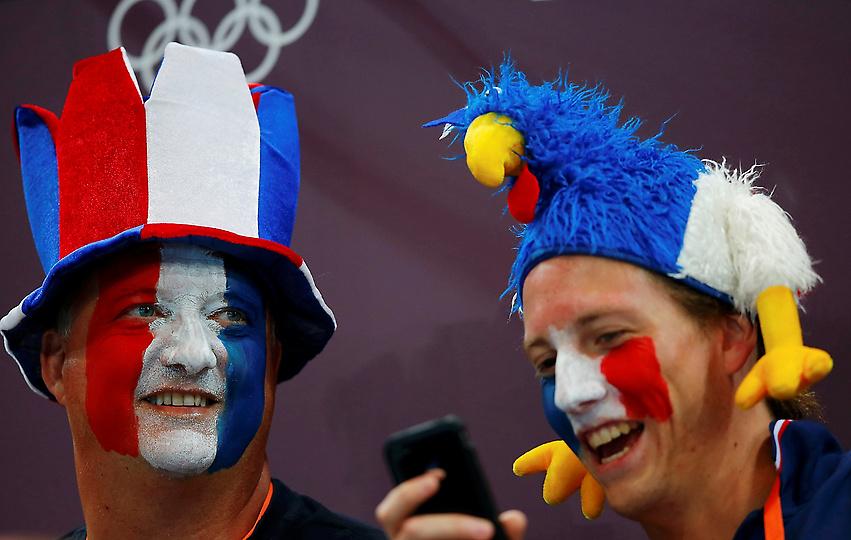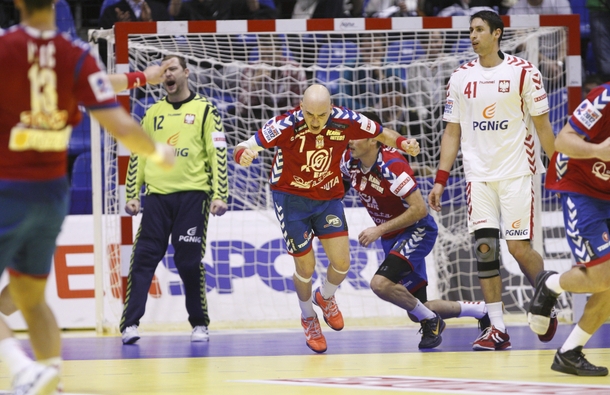
5 Time Olympian and Player-Coach Kyung-Shin Yoon leads the South Korean delegation into Olympic Stadium
Here’s some quick analysis and a few notes of the upcoming Olympic Tournament
Olympic Tournament Format Basics: The Olympic Tournament consists of two phases. The first phase, group play, has the nations divided up into 2 groups of 6 nations. Over 10 days the teams will play a round robin with the women and men alternating playing days. At the end of the first phase, the top 4 teams from each group will advance to the second phase. The second phase is a straight knock out competition with quarterfinals, semifinals and finals
Group Play is somewhat academic: The nature of this format makes group play somewhat academic since it’s very unlikely that the favored teams won’t finish in the top 4 and advance to the quarterfinals. So, a team can slip up in group play; heck even lose 3 times and still advance. Sure the nations would prefer a higher seed and avoid a tougher opponent in the quarterfinals, but that’s only a slight advantage. In 2004, France went 5-0 in group play then got unceremoniously bounced out by Russia in the quarterfinals. So, look at group play as extended warm-up for the top teams.
Favorites (Women): Here are the odds for the Women’s teams to win the gold medal. I’ve kept the teams in their respective groups so you can get a relative sense of each team’s projected finish.
Group A
Russia (3.5 to 1)
Montenegro (7.5 to 1)
Brazil (50 to 1)
Croatia (75 to 1)
Angola (500 to 1)
Great Britain (10,000 to 1)
Group B
Norway (1.75 to 1)
France (6.5 to 1)
Denmark (33 to 1)
Spain (34 to 1)
Sweden (33 to 1)
South Korea (50 to 1)
So, the oddsmakers have assessed that in Group A, Russia and Montenegro are near locks for a 1st or 2nd place finish. Brazil and Croatia are also expected to advance, while Angola and Great Britain are significant longshots. In Group B, Norway and France are expected to advance, but it should be a big fight between the remaining sides for spots 3 and 4. The big question mark is South Korea. South Korea didn’t perform particularly well at the World Championships in December, but they’ve been known in the past to regroup pretty quickly. Their fast style of play also has been known to give the Europeans fits.
Favorites (Men): Here are the odds for the men:
Group A
France (2 to 1)
Iceland (19 to 1)
Sweden (40 to 1)
Argentina (550 to 1)
Tunisia (550 to 1)
Great Britain (10,000 to 1)
Group B
Denmark (3.5 to 1)
Spain (5 to 1)
Croatia (5.5 to 1)
Serbia (30 to 1)
Hungary (40 to 1)
South Korea (150 to 1)
In Group A, France, Iceland and Sweden are pretty much guaranteed to advance. Argentina and Tunisia are expected to battle for 4th place. In Group B the teams are more closely bunched. Denmark, Spain and Croatia are the favorites while Serbia and Hungary are expected to battle for 4th. The difference between all 5 of those teams is not nearly as great, though compared to Group A. South Korea is expected to be an outsider, but then in Beijing they surprised everyone by winning their Group.
Great Expectations for Great Britain? My assessment is that the host nation is not like to win a match in this tournament. The scorelines for the past year suggest that the Women have made significant progress and there’s a good chance that they will keep the final scores respectable. Their best chance for victory is against Angola, who they actually beat in a friendly earlier this year. The Men will likely struggle against their competition and the best they can hope for is to be competitive against France, Iceland and Sweden (Keep the margin under 20). Against Tunisia and Argentina if they can keep the final margin under 10 they will be doing well. The real goal for Great Britain is not so much the outcome in London, but to leave a legacy that will enable them to continue the sport’s growth in their country. Other minor handball nations (USA and Australia) were able to get a marginal bounce from hosting the Olympics. Maybe the Brits can show the way.
Wither Karabatic? Since 2002, I’ve followed the career of Nikola Karabatic fairly closely. I’ll never forget seeing him play on TV for Montpellier, asking myself, “Who’s that guy? He’s pretty good” and being stunned to find out he was only 18 years old. I’ll go on the record as stating he’s the best all around player, I’ve ever seen, period. I’ve never seen a handball player do such a good job at making the players around him better. No more so was that evident then at the 2011 WC, where he shepherded a weak backcourt (Sorry, French youngsters, Accambray and Barrachet) to a gold medal. But, then at the 2012 Euros with Narcisse back in action, Karabatic instead of his usual masterful self was uncharacteristically pedestrian. Teams lose at teams, but France’s 11th place finish was largely due to his uncharacteristically pedestrian performance. More than his share of turnovers and some downright bad shots on goal. Even in the matches this past year in the Champions League he hasn’t seem to be his usual stuff. So the big question in my mind is whether the guy who’s the best I’ve ever seen can shake it off or will I need to re-evaluate the current pecking order of greatness. At 28, Karabatic should be at the peak of his powers, so I’m guessing we will see a return to earlier form.
Flag Bearers: Three handball athletes were honored with the opportunity to carry their nation’s flag in the opening ceremonies: Croatia’s Venio Losert, Tunisia’s Heykel Megannem and South Korea’s Kyung Shin Yoon. At 39, Yoon is playing in his 5th Olympics, this time as a player coach. Yoon also is notable for having the record as the all time goal scorer for the German Bundesliga.
Predictions
Women:
Gold: Norway
Silver: Russia
Bronze: Montenegro
Men:
Gold: France
Silver: Denmark
Bronze: Spain
OK. None of these are very bold, but it’s what I think will happen. I will, however, go out on a limb with this prediction: The French Men will shake off the doldrums from the Euros and have an undefeated run to the title. And, further they will comfortably win every match. My rationale is that the Euros have taught them what happens when they let the competition stick around and they will assert their superior talent early and often. We shall see, however, we shall see.


















